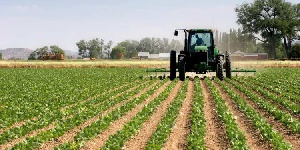The Peasant Farmers Association of Ghana (PFAG) has predicted tough times and ever-escalating food prices in the coming months, as a result of worsening conditions confronting the current planting season.
PFAG, at a press engagement in Accra, said farmers are in despair and frustrated over the current development under Planting for Food and Jobs 2.0 .
“We, members of PFAG in the various regions, are hereby addressing the good people of Ghana to understand the frustrations of our members and inform Ghanaians to brace themselves for tough times and high food prices if government does not intervene to resolve these issues,” said Executive Director-PFAG, Bismark Owusu Nortey.
Mr. Nortey explained that though farmers were promised implementation of government’s decision to facilitate the provision of land preparation services, mechanisation, extension, harvesting and marketing services in addition to all input support including seeds, fertiliser and agrochemicals under the PFJ II, these interventions are yet to be delivered even though farmers are already in the middle of the planting season.
“As it stands, none of these support services was comprehensively provided to farmers. This situation has placed farmers in a stranded position,” Mr. Nortey indicated.
The Association indicates that there are several emerging issues which contradict the programme’s original stated intent – which stakeholders believe is more politically motivated and not a genuine intervention to provide relief for farmers.
According to PFAG, the abysmal registration process – characterised by several challenges – made it difficult and demotivating for farmers to register, adding: “There is lack of adequate extension officers to collect farmers’ data, inadequate logistics to facilitate movement and the bad-timing of the process”.
As at last month July, an independent assessment – which is also corroborated by figures from the various District Departments of Agriculture – shows that less than 15 percent of the estimated farmer population have registered under the programme, which is very underwhelming according to PFAG.
More worryingly, the Association alleged that abandonment of the private sector-led concept of PFJ 2.0 is making many stakeholders lose hope in the sector.
“In addition to this challenge is the current input distribution formula under the grant component of PFJ 2.0, which has become extremely politicised and is serving as an avenue for some unscrupulous public officials and politicians to demand payments from farmers before benefitting,” PFAG noted.
Indeed, the Association highlighted current extended dry spells faced by farmers all over the country – especially in the northern and middle belt due to lack of rainfall – which has caused many crops to wilt.
“The situation is quite painful, considering the hefty amount of money that was spent on the One Village One Dam policy and Pwalugu Multi-Purpose Dam. These dams would have served as an alternate source of water for our farmers in these hard times, but they remain pits and holes while we suffer”
The Association appealed for government to in the immediate term assist farmers by providing financial support and emergency relief among others.
Business News of Monday, 19 August 2024
Source: thebftonline.com

















